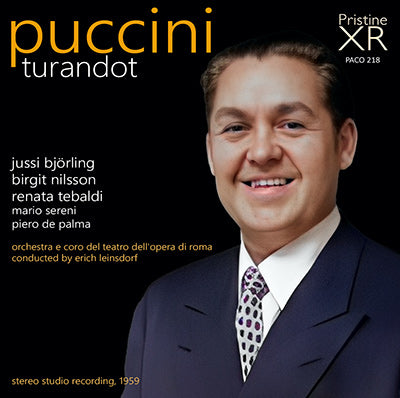
This album is included in the following sets:
This set contains the following albums:
- Producer's Note
- Full Track Listing
- Cover Art
When the RCA team gathered in Rome in July 1959 to record Puccini’s last opera Turandot, they brought two of Sweden’s most prestigious singers together for the first, and only, time into the recording studio. Though at different stages in their careers, they were only seven years apart in age. Birgit Nilsson was on the cusp of international stardom, with her Met debut just on the horizon in December of that year. Jussi Björling, by contrast, already had a twenty-year international career behind him, and had sung at the Met, on and off, since 1938. Nilsson would go on to make Turandot one of her signature stage roles. As Nilsson herself said: “Isolde made me famous. Turandot made me rich!”, Björling never sang the role of Calàf on stage, though his commercial recording of “Nessun dorma” in 1944 was one of his best-selling records.
In this, the first of her two recordings of the title role (her second for EMI, was released in 1966), Turandot holds no terrors for Nilsson, and the soaring vocal line is handled easily. She truly defines the role of the ice-princess, steely and cold until the final duet, and the role is particularly well-suited to Nilsson’s own laser-like soprano.
The role of Calàf requires a lyric-spinto tenor, someone who is able to rise to the dramatic climaxes while also offering a true legato line. Björling, in one of his last complete opera recordings, is fully able to do both, delivering pathos and heroism as required. This is most obvious at the end of Act One. “Non piangere Liù,” recorded in a single take, is one of the most heartfelt pieces of singing ever put on record, but just a few minutes later, Björling’s voices rings out forcefully with his repeated cries of ‘Turandot!’ as he hits the gong to declare his suit for Turandot.
Renata Tebaldi’s Liù could not be more different. Tebaldi, a very well-established star in her own right, is the sort of luxury casting that record companies could sometimes pull-off. Interestingly, despite never singing the role onstage, this was her second recording of the opera, her first being for Decca in 1955. Tebaldi brings all of her Italianate experience to bear to provide us with a very sympathetic portrait of this self-sacrificing tragic character.
Chicago-born and Met Opera stalwart, Giorgio Tozzi, gives a vocally potent portrayal of the dethroned Tartar King, Timur, and the smaller roles, taken by the experienced Italians Mario Sereni, Piero De Palma, and Tommaso Frascati, give knowing and detailed portrayals of their roles.
Austrian-born Erich Leinsdorf made his Met debut just weeks before his 26th Birthday conducting Wagner’s Die Walküre. During his long career at the Met, he conducted almost 500 performances. While he dominated the German repertory at the house from 1938-1945 (he conducted all ten of the major Wagnerian operas with the company), his extensive repertory included everything from Mozart to Verdi (he conducted the Met premiere of Macbeth in 1959), and Mussorgsky to Puccini. Previously for RCA, he had recorded Tosca with Zinka Milanov and Jussi Björling in 1957 (PACO163) and would conduct the first uncut broadcast of Wagner’s monumental Ring Cycle in modern times in 1961-62 (PABX022).
PUCCINI Turandot
disc one (74:45)
ACT ONE
1. Popolo di Pekino! (4:16)
2. Perduta la battaglia (1:17)
3. Gira la cote, gira, gira! (2:34)
4. Perché tarda la luna? (3:58)
5. O giovinetto! (4:31)
6. Figlio, che fai? (3:46)
7. Silenzio! (3:57)
8. Signore, ascolta! (2:32)
9. Non piangere, Liù (2:35)
10. Ah! per l'ultima volta! (2:35)
ACT TWO, SCENE ONE
11. Olà, Pang! Olà, Pong! (3:20)
12. Ho una casa nell'Honan (3:01)
13. O mondo, pieno di pazzi innamorati! (5:31)
14. Udite trombe! Altro che pace! (4:07)
ACT TWO, SCENE TWO
15. Un giuramente atroce mi costringe (4:17)
16. Popolo di Pekino! (1:36)
17. In questa Reggia (2:32)
18. O Principi, che a lunghe caravane (3:36)
19. Straniero, ascolta! (4:28)
20. Gelo che ti dà foco (3:15)
21. Figlio del cielo! (3:11)
22. Tre engmi m'hai proposto (3:50)
disc two (39:45)
ACT THREE, SCENE ONE
1. Cosi comanda Turandot (3:21)
2. Nessun dorma! (3:21)
3. Tu che guardi le stelle (4:01)
4. Principessa divina (2:50)
5. Quel nome! (1:20)
6. Tanto amore segreto (3:07)
7. Tu, che di gel sei cinta (3:08)
8. Liù...Liù...sorgi! (4:32)
9. Principessa di morte! (3:51)
10. O mio fio mattutino (7:17)
ACT THREE, SCENE TWO
11. Diecimila anni al nostro Imperatore! (2:57)
CAST
La principessa Turandot - Birgit Nilsson (soprano)
Il principe ignoto (Calaf) - Jussi Björling (tenor)
Liù - Renata Tebaldi (soprano)
Ping - Mario Sereni (tenor)
Pang - Piero De Palma (tenor)
Pong - Tommaso Frascati (tenor)
Timur - Giorgio Tozzi (bass)
L’imperatore Altoum - Alessio De Paolis (tenor)
Un mandarino - Leonardo Monreale (bass)
Il principino di Persia - Adelio Zaganara (tenor)
Orchestra e Coro del Teatro dell'opera di Roma
conducted by Erich Leinsdsorf
chorus master: Giuseppe Conca
Libretto by Adami and Simoni, based on Friedrich Schiller's adaptation of the play Turandot by Carlo Gozzi
Recorded July 3-4, 6-11 July 1959, Teatro dell'Opera di Roma
Stereo XR remastering by Andrew Rose
Front cover artwork: Jussi Björling
Total duration: 1hr 54:30

